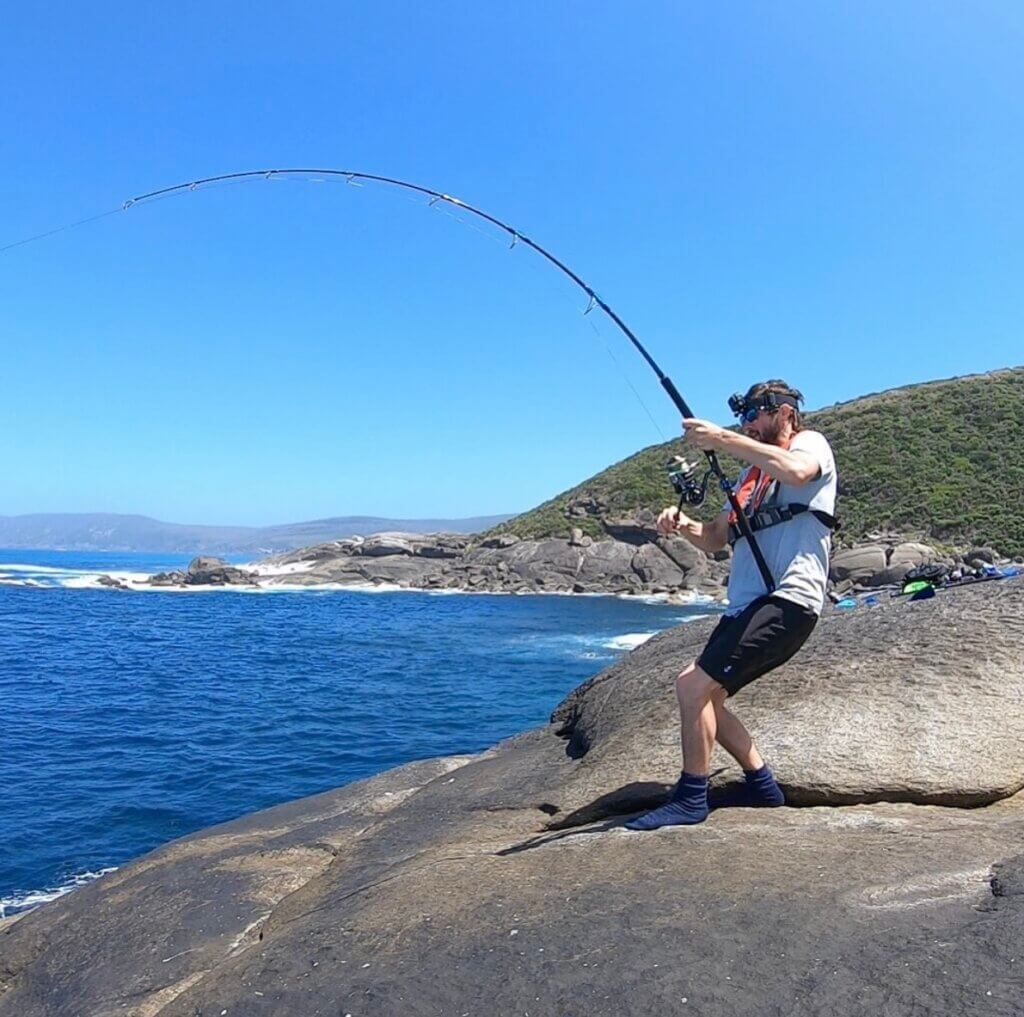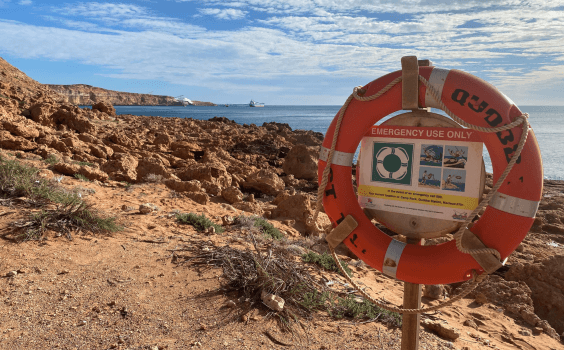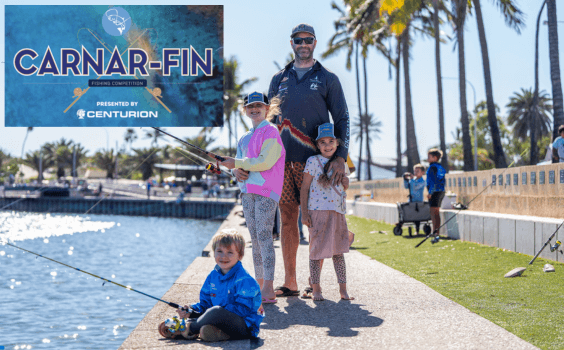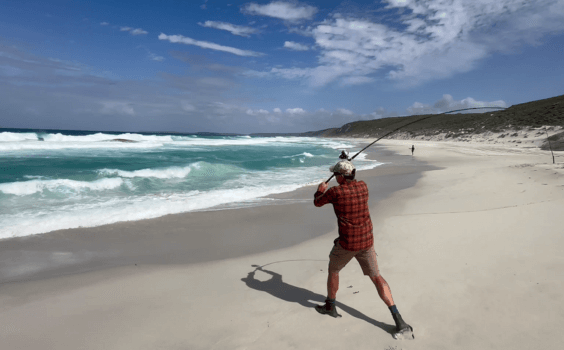Thinking about fishing from the rocks? You need to read this article!
Fishing from rocks comes with many risks, particularly in poor weather conditions and high swell. Even seasoned rock fishers can get caught out by so-called ‘rogue’ waves if not fully aware and prepared. Take Recfishwest safe fishing ambassador and famed rock fishing Youtuber, Chris Dixon for example.
Chris’s YouTube channel ‘Dixons Fishing’, keenly watched by 23,000 followers, showcases his fishing adventures from the beach, off boats and from some of WA’s renowned rocks and cliffs.
Check out Chris’s YouTube channel by clicking here
He is all too aware that the adrenaline rush of hooking up to a rampaging kingie or blue groper “off the stones” can override the constant attention you need to pay to the ocean and what it’s doing when rock-fishing at all times – with the worst possible outcome if you’re not careful. “I had always seen those heart-breaking crosses at fishing spots where tragically others have lost their lives,” said Chris.
Rewind a decade to a 21-year-old Chris eager to try his hand at rock fishing, when he was confident his skills would keep him safe from dangerous waves. “I was young and stupid, but careful. I was thinking surely it wouldn’t happen to me,” said Chris. “On a summer’s day, I was fishing a ledge that faced the Southern Ocean and was gaffing a sizable groper for my brother, Aron. I was five metres below him on a large sloping rock with us both well above the height any waves had been that day. It was a sunny with small swell and light winds, so nice conditions.”
But the mood of the waves can unexpectedly change very quickly
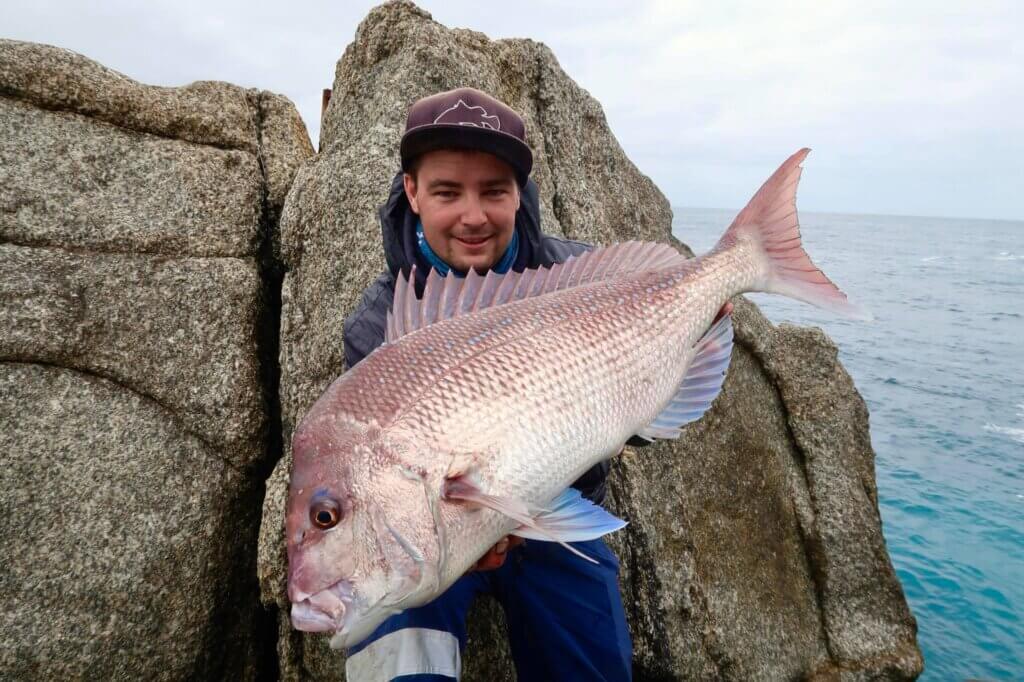
“I lost four grand’s worth of gear, but was lucky not to lose my life,” seasoned rock fisher Chris Dixon.
“Out of nowhere, I looked to my left and watched a wall of white water washing along the rock towards me. I dropped the gaff in my hand and turned and dug my fingers into a crack near my feet, getting as low as I could.
“The water washed right over me for what felt like minutes. Once the water receded, I was left right where I had been but was completely soaked,” said Chris.
“It only took that one wave to wash most of our tackle into the water from where it was set up. I lost $4,000 worth of gear was lost, but I was lucky not to lose my life.
“I had no life jacket on and I’m certain I wouldn’t have been able to get out of where I was or make it far enough swimming to reach safety. We were a few hours of four-wheel driving from the nearest highway and far from any help should we have needed it. If I had gone in that day, I am certain I wouldn’t be here now.”
Of course, it doesn’t have to be this way and there are simple ways you can prevent yourself from ending up in a similar position by paying close attention to your surroundings before dropping a line off the rocks.
Rethinking what you thought you knew about waves
“That day made me stop and think about my close call with a so-called ‘freak wave’ and the things that caused it. I re-checked the weather for the day and swell was the same size at 1.5m all day, so seemingly nothing to be concerned about,” he said.
“There was however a swell direction change from south-west to south-east and a swell period change from 14-seconds out to 18-seconds. I had no idea what that meant and how it could affect my rock fishing, but with a bit of research and talking to others, I am confident I had figured out the cause of ‘freak’, ‘king’ or ‘rogue’ waves. Whatever you call them, I don’t think they are unpredictable.”
Click here to watch this video on how to fish the south coast safely
Here are Chris’s tips on how to be one step ahead of the rogue waves.
Spotting wave direction changes
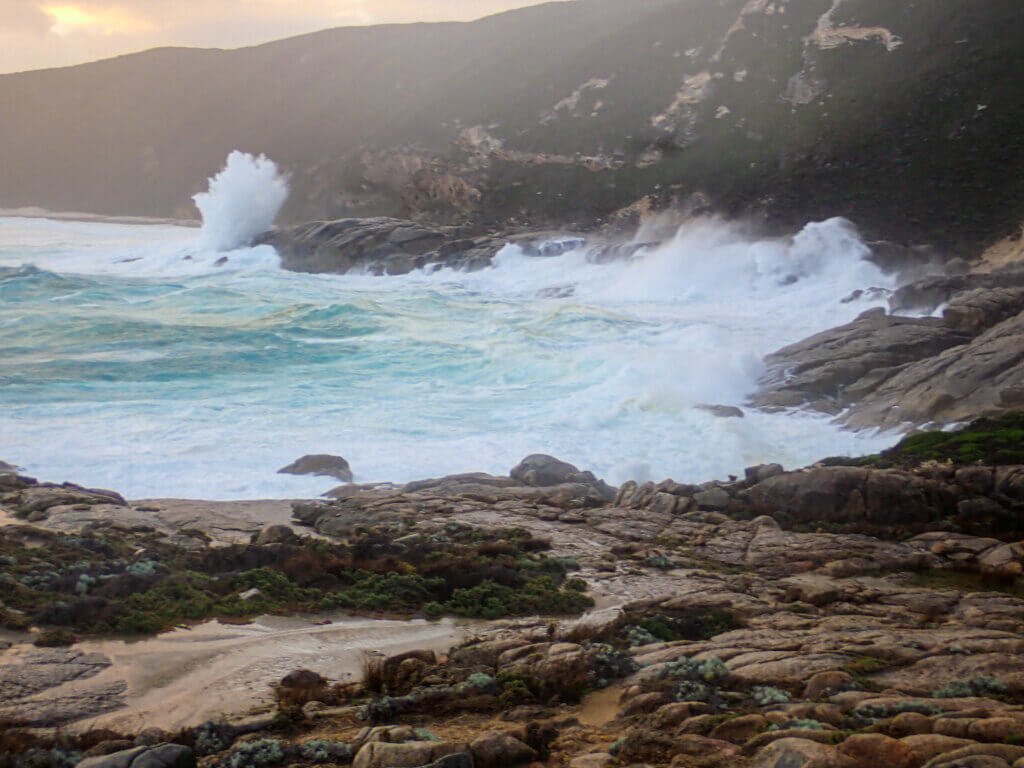
“Firstly, direction changes. With rock fishing your waves go back and forth in a rhythm. If you sit and watch a spot before fishing, you’ll see how most waves do almost the same thing and then a set will come through and be a little larger, nothing out of the ordinary.
“The most common swell direction for the southern part of the WA coast from Shark Bay to Esperance is south-west. This is what I call the dominant swell direction, and this can change frequently.
“When big high-pressure cells sit in the Great Australian Bight during summer, the swell can be flattened by the easterly winds and then the waves can come from the east along the south coast. Up to 2.5m easterly swells can be seen each summer and this is a dangerous swell if you’re fishing on rocks facing into it.
“Winter storms or cold fronts can produce southerly or even west-north-westerly swells. On days where the swell direction changes, you can have a wave pattern that comes through with no issues and then one wave will come from the direction it’s changing to. It’s those waves that bounce off the rocks differently.
“It can cause the following few waves to pick up in size and come much higher up the rocks than they would have otherwise. This is what I would call a freak wave. These conditions I find normally come a day before a storm (often the calm before a storm) or during summer as sustained winds change the swell direction.”
Understanding the ‘swell period’ and ‘swell timing’
“The next important factor you need to understand is swell period. There are two parts to this. Put simply, it’s the time between each wave. The larger the number in seconds, the more force the wave has. For example, a 12-second period has 12-seconds between each wave.
For rock fishing, the rhythm of waves is steady if the swell is evenly spaced. If a wave out of time with the others suddenly hits the rocks, it can multiply or bounce off other waves. The easiest way to describe it is like double bouncing someone on a trampoline. This unsteady rhythm can cause unpredictable waves and dangerous conditions. To reduce the risk of coming across a situation like that, I won’t fish any location that faces into the swell direction that has a change in a swell period.
The second part to swell period is the timing. A 12-second wave two metres high has half the energy of an 18-second wave also two metres high. The shorter the swell period, the taller a wave stands up, but it doesn’t have much water behind it moving so it has less energy to push up the rocks. However, a larger swell period of 16-20 seconds like we encounter before storms can be moving a lot more water with a lot more force. Even though the swell is the same size, a longer period wave can push much further up the rocks. I won’t fish any day with an increase in swell period or a swell period over 16-seconds in a location that faces into the swell to avoid these dangerous waves.
With that extra information I can now better predict what the swell is going to be doing and how it will affect my day’s fishing. I can then choose a location to fish that will be safer in the conditions.”
More ways to ensure coming home safely from a day’s rock fishing
Chris also recommends keeping a logbook and recording conditions each time you fish – if you’re serious about fishing from the rocks on a regular basis.
“I have a diary that I keep with all the conditions from all spots I’ve fished previously. I can then look at the weather forecast for the day I want to fish and check my diary to confirm it’s been safe to fish that weather in the past. Since making a few changes like that over the past decade since my scare, I haven’t come across another freak wave,” he said.
If you’re not experienced rock fishing should not be attempted lightly and keeping the sand between your toes might be a better option. But if you are going to give it a crack, make sure you take on board Chris’s advice above, you should also check out our rock fishing safety tips here.
